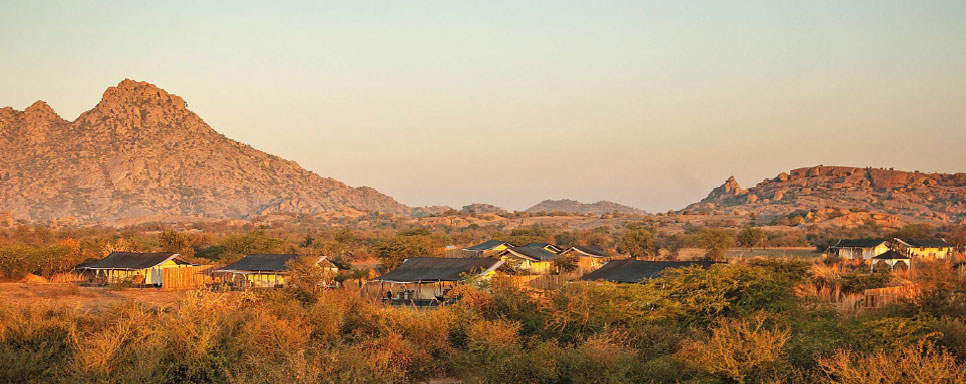Discovering the Wild Heritage of Jawai: A Leopard’s Paradise

Jawai is a unique wildlife destination that captivates with its dramatic beauty and rich biodiversity. Known as the "Leopard Hills," this area is distinguished by its striking granite hills and caves that form a perfect habitat for one of India’s most enigmatic big cats—the leopard. In this blog, we explore the wildlife heritage of Jawai and what makes it a compelling destination for nature enthusiasts and wildlife photographers. Jawai llocated in the rugged landscape of Rajasthan.
The Enigmatic Leopards of Jawai
Jawai is renowned for its exceptional leopard sightings. Unlike other regions where leopards are notoriously elusive, Jawai offers a unique opportunity to observe these magnificent creatures in relatively open terrain. The leopards here are known for their remarkable adaptability, often seen basking on the rocky outcrops or stealthily moving through the bushlands. This unusual visibility is attributed to the harmonious coexistence between the local Rabari herdsmen and the leopards, a relationship that has fostered mutual respect and minimized conflict.
The leopards of Jawai have adapted to the human presence, and sightings are frequent, especially during dawn and dusk safaris. This extraordinary situation makes Jawai a prime destination for wildlife photographers eager to capture the elusive beauty of these big cats in their natural habitat.
Avian Wonders and Other Wildlife
While leopards are the star attraction, Jawai’s biodiversity extends far beyond. The area is a haven for bird watchers, hosting over 150 bird species. The Jawai Bandh, a large reservoir, attracts a variety of migratory and resident birds. Notable species include the Indian eagle owl, flamingos, cranes, and the painted stork. The reservoir, with its scenic beauty and rich birdlife, is a must-visit for ornithologists and bird enthusiasts.
The ecosystem supports a variety of other wildlife as well. Hyenas, sloth bears, and Indian wolves can be spotted, although they are more elusive. The region also boasts a healthy population of crocodiles, often seen basking on the banks of Jawai Bandh.
The Unique Landscape of Jawai
Jawai National Park landscape is characterized by its striking granite hills, dotted with caves and scrubland, providing a perfect backdrop for wildlife adventures. These hills, known locally as "kopjes," offer the perfect vantage points for leopards and other wildlife, creating a dramatic and picturesque environment. The juxtaposition of these rocky formations against the expansive plains and the Jawai River makes for a visually stunning setting.
The Rabari community, traditional herdsmen, adds a cultural dimension to the landscape. Their white turbaned figures and colorful attire against the stark, rocky terrain create a vibrant tableau, reflecting a way of life that has remained largely unchanged for centuries. Their presence and practices are integral to the unique ecosystem of Jawai, fostering a rare harmony between humans and wildlife.
Conservation Efforts and Community Involvement
Conservation in Jawai is uniquely community-driven. The Rabari herdsmen have coexisted with the leopards for generations, a relationship built on respect and tolerance. This symbiosis has significantly contributed to the preservation of the leopard population in Jawai. Community-led initiatives and responsible tourism are key to maintaining this delicate balance.
Efforts are being made to promote sustainable tourism that benefits both the local community and the wildlife. Eco-friendly accommodations and guided tours are designed to minimize the environmental footprint while providing an immersive experience for visitors. Supporting local businesses and participating in community-based projects can help ensure that the benefits of tourism are equitably distributed, fostering long-term conservation goals.
Exploring Jawai: Tips for Visitors
For those planning to visit Jawai, the best time is between October and March when the weather is pleasant, and wildlife sightings are more frequent. Safaris, both in jeeps and on foot, are the best ways to explore the area. Hiring a knowledgeable local guide enhances the experience, providing insights into the behavior of the leopards and other wildlife.
Accommodations in Jawai range from luxurious safari camps to charming homestays. Many lodges offer packages that include safaris, bird-watching tours, and cultural experiences with the Rabari community. Staying in these lodges provides a chance to unwind amidst nature while supporting eco-tourism initiatives.
Conclusion
Jawai stands as a testament to the harmonious coexistence of humans and wildlife. Its rugged beauty, rich biodiversity, and the unique relationship between the leopards and the local community make it a fascinating destination for any wildlife enthusiast. By visiting Jawai and engaging in responsible tourism, we contribute to the preservation of this extraordinary ecosystem, ensuring that future generations can continue to marvel at its natural and cultural treasures.